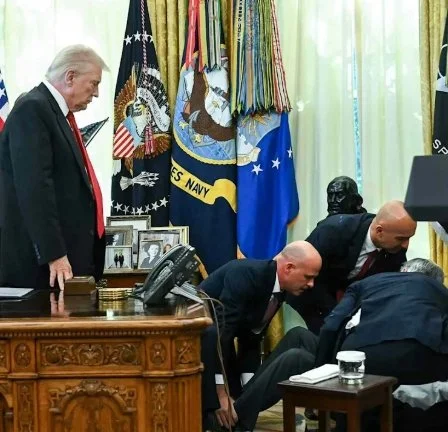Psychological Profile of Putin
This analysis is for educational purposes and is not a clinical diagnosis. It draws on publicly available behaviours and academic psychological frameworks.
A Post-Invasion Analysis
The unjust Russian invasion of Ukraine in February 2022 marked a significant geopolitical upheaval, bringing to light complex psychological dimensions of leadership, nationalism, and aggression. At the centre of this conflict stands the now infamous Vladimir Putin, a figure whose psychological profile has been the subject of intense debate. This article delves into the psychological underpinnings of Putin's actions and leadership style, drawing on peer-reviewed literature to explore the motivations, personality traits, and possible cognitive biases influencing his decisions.
2025 Update: Is This Analysis Still Relevant?
This section was added in April 2025 to ensure the continued accuracy and relevance of our analysis.
Since this article was published in June 2024, key developments have further reinforced many of the psychological patterns discussed below. The internal consolidation of power, persistent use of propaganda, and isolation from Western allies continue to reflect a leadership style rooted in control, nationalism, and authoritarianism. Notably:
Domestic dissent has grown, with crackdowns intensifying in response to protests and criticism.
Speculation about Putin's health has become more frequent, potentially influencing decision-making under stress.
Geopolitical isolation deepened through reliance on alliances with nations like North Korea and Iran, reinforcing in-group/out-group dynamics.
Information warfare, including AI-generated propaganda, has expanded, further entrenching control over the Russian narrative.
While some events have evolved, the core psychological profile remains consistent and arguably even more pronounced in 2025.
Historical and Political Context
Understanding Putin's psychology requires a grasp of the historical and political context in which he operates. Born in 1952, Putin's formative years were shaped by the Cold War and the dissolution of the Soviet Union, an event he has famously described as the "greatest geopolitical catastrophe" of the 20th century. His tenure as a KGB officer further ingrained a worldview characterized by secrecy, suspicion, and the strategic use of power.
Personality Traits and Leadership Style
Putin's personality can be analysed through the lens of the Five-Factor Model, which includes traits such as openness, conscientiousness, extraversion, agreeableness, and neuroticism. Studies suggest that Putin exhibits high conscientiousness, manifesting in a seemingly disciplined and strategic approach to governance. However, his low agreeableness and high levels of neuroticism are notable, reflecting his intensely adversarial and often paranoid stances towards both domestic and international affairs.
Motivations and Cognitive Biases
Need for Control and Power
One of Putin's primary motivations appears to be a profound need for control and power, likely stemming from both personal and national insecurities. The invasion of Ukraine can be seen as an attempt to reassert Russian dominance and rectify perceived historical injustices. This aligns with theories of compensatory control, which suggest that individuals seek to regain a sense of control when confronted with uncertainty or instability.
Nationalism and Identity
Putin's actions are also deeply rooted in a nationalistic vision of a resurgent Russia. His rhetoric often invokes the idea of a "Greater Russia," appealing to historical narratives and collective memory to justify territorial expansion. This use of national identity as a political tool can be understood through the lens of social identity theory, which posits that individuals derive self-esteem from their group affiliations and may act aggressively to defend or enhance their group's status.
Cognitive Dissonance and Rationalization
Cognitive dissonance theory provides insight into how Putin rationalizes his abhorrent actions. Faced with international condemnation and economic sanctions, Putin's steadfastness can be seen as a way to resolve the dissonance between his self-perception as a strong leader and the negative consequences of his policies. By framing the invasion as a necessary and justified action, he reduces psychological discomfort and reinforces his commitment to his chosen course of action.
Impact of Authoritarian Leadership
Authoritarian leadership, characterized by centralization of power and suppression of dissent, has significant psychological impacts on both leaders and followers. For Putin, maintaining an authoritarian regime involves constant vigilance and the suppression of perceived threats, both internal and external. This can lead to heightened stress and paranoia, further entrenching his adversarial worldview.
For the Russian populace, exposure to authoritarian rule can result in a learned helplessness and reduced political efficacy, as citizens come to believe that they have little influence over political outcomes. Additionally, state propaganda and control over information can shape public perceptions and reinforce support for the regime, creating a feedback loop that sustains his authoritarian power.
Simply Put
The psychological analysis of Vladimir Putin post-invasion of Ukraine reveals a complex interplay of personality traits, motivations, and cognitive biases. His need for control, nationalistic fervour, and use/misuse of authoritarian power are central to understanding his condemned actions. While psychological theories provide some meaningful insights, it is crucial to consider the broader socio-political context in which these behaviours manifest. Future research should continue to explore the dynamic relationship between individual psychology and geopolitical actions to offer a more comprehensive understanding of the global political landscape.
Support Ukraine
UNITED24 - The initiative of the President of Ukraine (u24.gov.ua)
Ukraine Crisis Appeal | British Red Cross
HFU Landing Page - Hope for Ukraine
References
Festinger, L. (1957). A Theory of Cognitive Dissonance. Stanford University Press.
Götz, E. (2016). Putin, the State, and War: The Causes of Russia’s Near Abroad Assertion Revisited.
Seligman, M. E. P. (1972). Learned Helplessness. Annual Review of Medicine, 23(1), 407-412.
Stent, A. (2019). Putin's World: Russia Against the West and with the Rest. Twelve.









